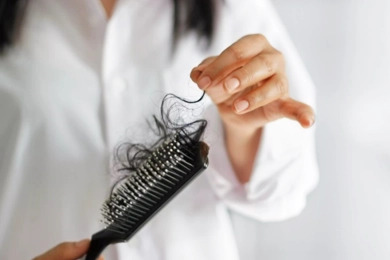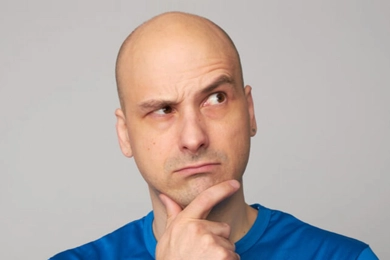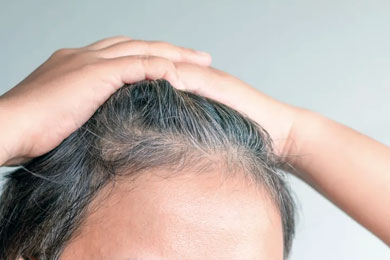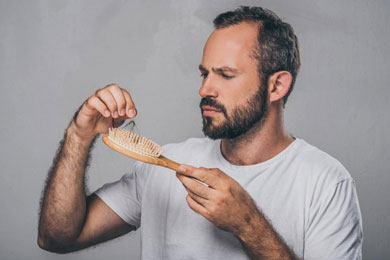
Our comprehensive examination of hair loss is a subject that affects a great number of women worldwide. Although female alopecia is frequently overlooked in comparison to male baldness, it does affect a significant number of women and has detrimental effects on their self-esteem and physical appearance. We will examine the various complex causes of hair loss in women in this blog post, including lifestyle choices and hormonal imbalances.
Hereditary Influences: Analogous to males, females are also capable of inheriting alleles that render them prone to experiencing hair loss. Androgenetic alopecia, or female pattern hair loss, has familial history as its root cause.
Understanding Genetic Hair Loss: An investigation into the manner in which genetics can impact the hair growth cycle in women, resulting in thinning and hair loss.
Hormones and Hair Health: Male alopecia is significantly influenced by hormonal shifts. Phallicodysia can be precipitated by factors such as pregnancy, polycystic ovary syndrome (PCOS),and menopause.
Thyroid Disorders: Given the thyroid's vital involvement in hair health and growth, hair loss can be an unintended consequence of hyperthyroidism or hypothyroidism.
The Role of Nutrition: An Examination of the Significance of Nutrition: Explore the ways in which insufficiencies of vital vitamins, iron, and protein can contribute to laxity and loss of hair.
Diet and Hair Health: Discuss the positive effects of a nutrient-dense, well-balanced diet on hair health and growth.
Elevated stress levels have the potential to induce premature hair transition into the telogen phase, which is the hair's slumber phase. This premature transition can result in telogen effluvium, an excessive shedding of hair.
Stress Management: Assisting in the prevention of stress-induced hair loss requires counsel on stress management.
Autoimmune Conditions: Significant alopecia areata-causing hair loss is an example of an autoimmune disorder in which the immune system targets hair follicles.
Side Effects of Medications: As an adverse consequence, hair loss may be induced by specific medications, including chemotherapy drugs.
External Aggressors: Hair thinning and loss can be exacerbated by factors such as pollution, UV exposure, and severe hair care practices.
Advice on Hair Care: Provide guidance on how to minimize damage and promote hair health through the use of mild hair care routines and products.
In summary,
Numerous potential factors contribute to the complexity of hair loss in women. Women can manage and treat hair loss more effectively by being aware of these factors and by adopting a proactive stance. Keep in mind that this voyage is not solitary, and that numerous resources and treatments are at your disposal. What causes hair loss in females?
Hair loss in females may be precipitated by an assortment of factors. The most prevalent causes of alopecia are nutritional deficiencies (e.g., low iron levels),hormonal fluctuations (e.g., those encountered during menopause or pregnancy),genetic predispositions (e.g., androgenetic alopecia or female pattern hair loss),stress, specific medical conditions (e.g., thyroid disorders),certain medications (e.g., certain birth control pills),and abrasive hair care methods (e.g., frequent heat styling or chemical treatments). Hair thinning or loss may result from the disruption of the normal hair growth cycle caused by each of these elements.
Hair loss is a prevalent condition that escalates in frequency as women age. Although there is some variation in the precise prevalence, it is hypothesized that as many as fifty percent of women undergo noticeable hair thinning by the age of fifty. In contrast to males, females typically encounter a diffuse thinning of the complete scalp as opposed to a receding hairline or a bald spot.
Changes in hormone levels do indeed contribute significantly to hair loss in women. Thyroid imbalances, pregnancy, and menopause are all contributing factors to hair reduction. Elevated estrogen levels during pregnancy may in fact contribute to the development of denser hair, whereas postpartum hormonal fluctuations frequently cause substantial hair loss. Hormonal fluctuations associated with menopause, specifically reduced levels of estrogen and progesterone, may also contribute to the thinning of hair. The hair growth cycle can be disrupted by thyroid disorders, including hyperthyroidism and hypothyroidism, which can result in hair loss.
The genetic component of female pattern hair loss, or androgenetic alopecia, is substantial. The condition is hereditary and results from the sensitivity of hair follicles to androgens, which are male hormones found in both genders. A common manifestation of this condition is hair thinning on the upper portion of the cranium.
Androgenetic alopecia, alternatively referred to as female pattern hair loss, is a hereditary disorder that manifests as a progressive thinning of the hair, with a particular emphasis on the summit and apex of the scalp. It is impacted by androgens, or male hormones, which, albeit in lesser quantities, are present in all women. Women with this condition have androgen-sensitive hair follicles, which gradually diminish in size and produce hair that is finer and shorter.
Telogen effluvium is a form of hair loss that can be induced by stress. This occurs when a considerable quantity of hair follicles enter a dormant phase in response to intense stress. A few months later, abruptly, affected hairs may fall out during combing or washing. Additionally, androgenetic alopecia and other types of hair loss may be exacerbated by stress.
Insufficiency of vital nutrients in one's diet may be a contributing factor to hair loss. A diverse array of nutrients is necessary for hair follicles to sustain a robust growth cycle. This cycle can be disrupted by deficiencies in minerals, proteins, iron, vitamins (particularly B vitamins and vitamin D),and proteins, which can result in hair loss and thinning. It is essential to consume a balanced diet that is abundant in these nutrients in order to preserve healthy hair.
Traction alopecia is a form of hair loss that can be induced by specific hairstyles, including tight ponytails, braids, and cornrows, which impose an inordinate amount of tension on the hair. This phenomenon can be attributed to the persistent tugging force exerted on the hair follicles, which, as time passes, may damage them to the point of hair loss.
Elevated concentrations of estrogen throughout pregnancy extend the hair growth phase, resulting in reduced discharge and an increase in hair thickness. Postpartum hair loss occurs when a significant number of hair follicles enter the dormant phase (telogen) concurrently with the decline in estrogen levels that occurs after childbirth. Usually, this condition is transient in nature, with hair resuming its regular course within a span of several months.
Hair loss may occur as a consequence of menopause-induced reductions in progesterone and estrogen levels. These hormones promote accelerated hair growth and increased hair retention. Hair tends to become thinning and growth diminishes when their levels decrease. Further, menopause is associated with a relative increase in androgen levels, which may also play a role in hair thinning.
Telogen effluvium is a transient hair loss condition that typically manifests in response to stress, trauma, or a sudden shock. It induces an accelerated transition of hair follicles into the telogen phase, which is characterized by a reduction in discharge. This condition is typically reversible; once the underlying cause is eliminated, hair growth returns to normal.
Hair loss can be caused by both hyperactive (hyperthyroidism) and hypoactive (hypothyroidism) thyroid disorders. Including hair growth, the thyroid gland regulates the body's metabolism, which is an essential function. The hair growth cycle may be disrupted by an imbalance in thyroid hormones, leading to hair thinning and loss.
Hair loss can result from iron deficiency, one of the most prevalent nutritional deficiencies. Iron is necessary for the synthesis of hair cell protein; insufficiency of iron can inhibit hair growth, resulting in loss and thinning.
Vitamin D is an essential component in the maintenance and growth of hair. Hair loss may result from a deficiency in vitamin D, which negatively affects the health of hair follicles. Since it is hypothesized that vitamin D promotes the development of hair follicles, deficiency in this essential nutrient can impede hair growth.
Using birth control medications may result in hair loss for some women, particularly those who are predisposed to hormonally-induced hair loss. This is the result of hormone level fluctuations induced by these contraceptives. A discontinuation of the pill may lead to hair loss in certain individuals, as the body adapts to the hormonal fluctuations.
As a result of hormonal imbalances, PCOS can cause hair loss and thinning in women, specifically an excess of androgens (male hormones). Hair follicle miniaturization and a shortening of the hair growth cycle may result from these hormonal fluctuations, ultimately leading to hair thinning.
Whether or not hair loss is reversible in women is contingent on the underlying cause. Frequently reversible are conditions such as telogen effluvium and hair loss caused by nutritional deficiencies. Nevertheless, androgenetic alopecia, a form of genetic hair loss, is typically irreversible; however, treatment can delay its progression.
Female pattern baldness is characterized by a general thinning or broadening of the part, which preserves the integrity of the hairline, in contrast to male pattern baldness.
Particularly those that contain harsh chemicals, specific hair care products can cause hair injury and loss. Additionally, excessive use of thermal styling tools can contribute to hair loss and weaken hair.
Hair loss may result from anemia, specifically iron-deficiency anemia, due to the critical role that iron plays in hair growth. Iron depletion via supplementation or dietary means can be beneficial for hair health.
Regular styling, particularly when utilizing heat and confined hairstyles, can subject hair to mechanical strain, ultimately resulting in breakage and progressive hair loss.
For healthy hair growth, a healthy epidermis is vital. Hair loss can be caused by conditions such as seborrheic dermatitis or psoriasis of the scalp.
Alopecia areata is an autoimmune disorder in which hair follicles are targeted by the immune system, resulting in the eventual loss of hair. The degree of hair loss is proportional to the condition's severity.
Frequent hair coloring, particularly with strong chemicals, has the potential to cause hair and scalp injury, which may ultimately result in hair loss.
Hormonal fluctuations cause hair thinning in many women during menopause; therefore, hair loss is a prevalent symptom of this stage of life.
Although hair loss may arise from benign factors, it can occasionally serve as an indicator of a more serious medical condition, including an autoimmune disorder, nutritional deficiency, or hormonal imbalance.
Hair heath and loss can be promoted and prevented with a balanced diet that is abundant in proteins, vitamins (particularly B vitamins and vitamin D),minerals (such as iron and zinc),and omega-3 fatty acids.
How effective are hair loss treatments like minoxidil for women?
Minoxidil may be effective in promoting hair growth and decelerating hair loss; it is an FDA-approved treatment for female pattern hair loss.
How does smoking affect hair loss in women?
In addition to reducing blood flow to the cranium, smoking can cause hair loss by introducing toxins that can harm hair follicles.
Can weight loss cause hair loss in women?
Achieving rapid or substantial weight loss may induce hair loss as a result of nutritional deficiencies or the psychological strain associated with abrupt weight fluctuations.
How does excessive sun exposure affect hair health?
Hair that has been exposed to the sun for an extended period of time may become brittle and dry, and the epidermis may be harmed, which may result in hair loss.
Are there any specific hair loss patterns in women?
In contrast to males, diffuse thinning of the scalp is more commonly observed in females, with a more pronounced reduction at the dividing.
Can dehydration affect hair health?
It is crucial for overall health, including hair health, to maintain sufficient hydration. Dehydration can cause hair to become brittle and dried, making it more susceptible to breakage and shedding.
What are the early signs of hair loss in women?
Observing an increased amount of hair on the brush or in the shower drain, a widening part, or a visible cranium through the hair are all early indicators.
Can lack of sleep contribute to hair loss?
Insomnia can have detrimental effects on various aspects of health, including the hair, by inducing hormonal imbalances and stress, both of which risk contributing to hair thinning.
Is it normal to lose hair every day?
Daily hair loss between 50 and 100 strands is typical during the natural hair growth cycle. However, any further losses beyond this threshold may suggest an underlying issue.
How long does postpartum hair loss last?
Typically, postpartum hair loss reaches its maximum three to four months after delivery and concludes spontaneously within six to twelve months.
Can scalp massages help with hair growth?
Scalp massages may stimulate hair growth by increasing blood flow to the scalp, although scientific evidence to support this claim is limited.
Are there any natural remedies effective for hair loss?
Although natural remedies such as biotin supplements, essential oils, and aloe vera are widely used, their efficacy is inconsistent and there is a scarcity of scientific evidence to support their application. It is advisable to seek guidance from a healthcare professional prior to experimenting with novel treatments.
 Causes of Hair Loss in Man
Causes of Hair Loss in ManA sizable percentage of males suffer from hair loss, a normal yet frequently upsetting condition. This thorough book explores the many factors that contribute to male hair loss, providing information and und ...
 Stress, Anxiety And Hair Loss: Are They Related?
Stress, Anxiety And Hair Loss: Are They Related?Millions of people around the world struggle with the common problem of hair loss. Many people wonder if anxiety and psychological stress can also cause hair loss, which can be brought on by numerous factors ...
 Causes, Remedies, and Prevention of Hair Loss
Causes, Remedies, and Prevention of Hair LossFor both men and women, experiencing hair loss can be upsetting. Numerous factors, such as genetics, hormonal changes, medication, illness, and inadequate nutrition, can cause it. ...